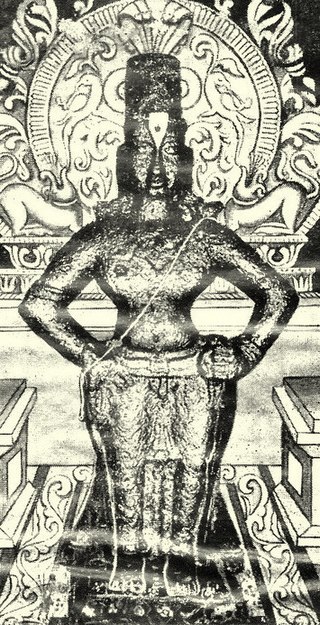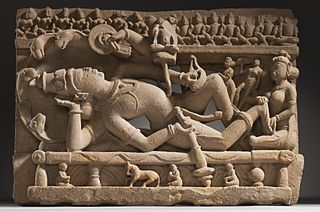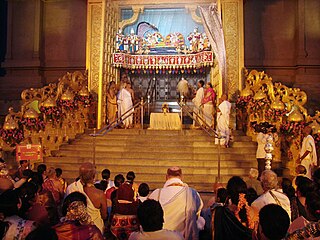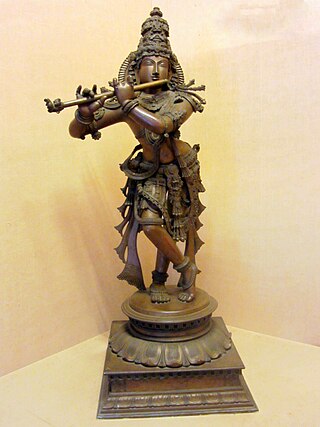Related Research Articles

Śrāvaṇa is the fifth month of the Hindu calendar. In India's national civil calendar, Śrāvaṇa is the fifth month of the year, beginning on July 23 and ending on August 22. In the Tamil calendar, it is known as Āvani and is the fifth month of the solar year. In lunar religious calendars, Śrāvaṇa begins on the new moon or the full moon and is the fifth month of the year. Srabon is the fourth month of the solar Bengali calendar. It is also the fourth month of the Nepali calendar. Śrāvaṇa is also the second month of Varsha.

Naga Panchami is a day of traditional worship of Nag or snakes observed by Hindus, Jains, and Buddhists throughout India, Nepal, and other countries where Hindu, Jain, and Buddhist adherents live. The worship is offered on the fifth day of bright half of lunar month of Shravana (July/August), according to the Hindu calendar. Some Indian states, such as Karnataka, Rajasthan and Gujarat, celebrate Naga Panchami on the dark half of the same month. As part of the festivities, a Naga or serpent deity made of silver, stone, wood, or a painting is given a reverential bath with milk and their blessings are sought for the welfare of the family. Live snakes, especially cobras, are also worshipped on this day, especially with offerings of milk and generally with the assistance of a snake charmer.

Radhashtami is a Hindu religious day commemorating the birth anniversary of the goddess Radha, the chief consort of the god Krishna. It is celebrated in her birthplace Barsana and the entire Braj region on the eighth day (ashtami) of the bright (waxing) half of the lunar month of Bhadrapada. Radhashtami falls fifteen days after Krishna Janmashtami.

Vithoba, also known as Vitthala, and Panduranga, is a Hindu god predominantly worshipped in the Indian state of Maharashtra and Karnataka. He is a form of the god Vishnu. Vithoba is often depicted as a dark young boy, standing arms akimbo on a brick, sometimes accompanied by his consort Rakhumai.

Sena Nhavi, also known as Saint Sena, and Sena, is a Hindu saint-poet (sant-kavi) of the Varkari sect dedicated to the god Vithoba.

Shayani Ekadashi, also known by various other names, is the eleventh lunar day (Ekadashi) of the bright fortnight of the Hindu month of Ashadha. This occasion is holy to Vaishnavas, the followers of the Hindu preserver deity, Vishnu, as it is regarded to be the day the deity's sleep commences.

Vaikuntha Ekadashi is a Hindu occasion and festival. It is primarily observed by Vaishnavas, who regard it to be a special ekadashi. It coincides with Mokshada Ekadashi or Putrada Ekadashi. It is observed on the 11th lunar day of the waxing lunar fortnight of the solar month of Dhanu. This falls between 16 December and 13 January in the Gregorian calendar.

Kartika Purnima is a Hindu, Sikh and Jain cultural festival that is celebrated on Purnima. It falls in November or December of the Gregorian calendar and is also known as Tripurari Purnima or Deva-Deepavali, the gods' festival of lights. Karthika Deepam is a related festival that is celebrated in South India and Sri Lanka on a different date. It follows Diwali by about 15 days.

Chaturmasya, also rendered Chāturmāsa, is a holy period of four months, beginning on Shayani Ekadashi (June-July) and ending on Prabodhini Ekadashi (October-November) in Hinduism. This period also coincides with the monsoon season in India.

Prabodhini Ekadashi, also known as Deva Uttana Ekadashi, is the 11th lunar day (ekadashi) in the bright fortnight of the Hindu month of Kartika. It marks the end of the four-month period of Chaturmasya, when the god Vishnu is believed to be asleep. It is believed that Vishnu sleeps on the day of Shayani Ekadashi, and wakes on this day.
Haragapur is a village in Belgaum district in the southern state of Karnataka, India. It is attached to NH-4. Places to visit are Shivaji Fort, Mallikarjun Temple & Navanath Mandir. Village is located on Hilltop. Language spoken here is Kannada

Rama Navami is a Hindu festival that celebrates the birth of Rama, one the most popularly revered deities in Hinduism, also known as the seventh avatar of Vishnu. He is often held as an emblem within Hinduism for being an ideal king and human through his righteousness, good conduct and virtue. The festival falls on the ninth day of the bright half of the lunar cycle of Chaitra (March–April), the first month in the Hindu calendar. It is also part of the Chaitra Navaratri festival in spring. Rama Navami is a holiday for government employees in India.

Amalaka Ekadashi or Amalaki Ekadashi is a Hindu holy day, celebrated on the 11th day (ekadashi) of the waxing moon, in the lunar month of Phalguna (February–March). It is a celebration of the amalaka or amla tree, known as the Indian gooseberry.

Nirjala Ekadashi is a Hindu holy day falling on the 11th lunar day (ekadashi) of the waxing fortnight of the Hindu month of Jyeshtha (May/June). This ekadashi derives its name from the water-less (Nir-jala) fast observed on this day. It is considered to be the most austere and hence the most sacred of all 24 ekadashis. If observed religiously, it is said to be the most rewarding and granting the virtue gained by the observance of all 24 ekadashis in the year.
Putrada Ekadashi is a Hindu holy day, which falls on the 11th lunar day (ekadashi) of the fortnight of the waxing moon in the Hindu month of Pausha (December–January). This day is also known as Pausha Putrada Ekadashi, to differentiate it from the other Putrada Ekadashi in Shravana (July–August), which is also called Shravana Putrada Ekadashi. Couples fast on this day and worship the god Vishnu for a good son. This day is especially observed by Vaishnavas, followers of Vishnu. A son is considered entirely important in Hindu society as he takes care of the parents in their old age in life and by offering shraddha ensures well-being of his parents in the after-life. While each ekadashi is prescribed for certain goals, the goal of having sons is so great that two Putrada ekadashis are devoted to it. Rest of the goals do not enjoy this privilege.

Mokshada Ekadashi is a Hindu holy day, which falls on the 11th lunar day (ekadashi) of the fortnight of the waxing moon in the Hindu month of Margashirsha (Agrahayana), corresponding to November–December. Hindus, particularly Vaishnavas, observe a 24-hour fast in honour of the deity Krishna, an avatar of Vishnu.

Kamada Ekadasi is a Hindu occasion, which falls on the 11th lunar day (ekadashi) of the fortnight of the waxing moon in the Hindu month of Chaitra (March–April). It is the first ekadashi after the Chaitra Navaratri, the Hindu lunar new year. As its name Kamada suggests, it is believed to be the occasion when all the desires of a devotee are granted.

Varuthini Ekadashi, also known Baruthani Ekadashi, is a Hindu holy day, which falls on the 11th lunar day (ekadashi) of the fortnight of the waning moon in the Hindu month of Chaitra or Vaishakha. By both schemes, Varuthini Ekadashi falls on the same day in April or May. Vamana, the fifth avatar of Vishnu, is revered.

Datta Jayanti, also known as Dattatreya Jayanti, is a Hindu festival, commemorating the birth of the Hindu deity Dattatreya (Datta), a combined form of the Hindu male divine trinity of Brahma, Vishnu, and Shiva.

Jhulan Purnima,Jhulan Yatra or Hindola is a Hindu swinging festival that is dedicated to Hindu god Krishna and goddess Radha. It is popularly celebrated by the Hindu Vaishnava sect in the month of Shravana (July-August) which falls under the monsoon season in India when the weather is hot, humid and slightly breezy. This festival is known for its display of decorated swings, songs and dance. It is a joyful festival which celebrates the amour of divine couple Radha and Krishna along with the romantic fervor of the rainy season in India.
References
- ↑ Shravana Putrada Ekadashi
- 1 2 3 "Shravana Putrada Ekadashi". Drik Panchang .com. Retrieved 17 November 2012.
- ↑ James G. Lochtefeld (2002). The Illustrated Encyclopedia of Hinduism: Volume Two . The Rosen Publishing Group. pp. 540–1. ISBN 978-0-8239-3180-4.
- ↑ Lochtefeld, James G. (2002). The Illustrated Encyclopedia of Hinduism: A-M. ABC-CLIO. pp. 218–9. ISBN 9781598842050 . Retrieved 16 November 2012.
- 1 2 Sehgal, Sunil (1999). Encyclopaedia of Hinduism: C-G, Volume2. Sarup & Sons. pp. 535–6. ISBN 9788176250641 . Retrieved 17 November 2012.
- ↑ PAvitropAna or PutradA EkAdasii by ISKCON
- ↑ "Home". Jhulan Yatra - the festival of swing. Iskcon Calacutta. Retrieved 19 November 2012.